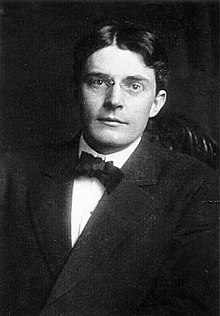John B. Watson
| John B. Watson | |
|---|---|
 |
|
| Born | John Broadus Watson January 9, 1878 Travelers Rest, South Carolina |
| Died | September 25, 1958 (aged 80) New York City, New York |
| Nationality | American |
| Fields | Psychology |
| Doctoral advisor | J. R. Angell |
| Other academic advisors | John Dewey, H. H. Donaldson, Jacques Loeb |
| Known for | Founding Behaviorism |
| Influences | Ivan Pavlov |
| Influenced | Leonard Bloomfield |
John Broadus Watson (January 9, 1878 – September 25, 1958) was an American psychologist who established the psychological school of behaviorism. Watson promoted a change in psychology through his address Psychology as the Behaviorist Views it, which was given at Columbia University in 1913. Through his behaviorist approach, Watson conducted research on animal behavior, child rearing, and advertising. In addition, he conducted the controversial "Little Albert" experiment and the Kerplunk experiment. Watson popularized the use of the scientific theory with behaviorism. He was also editor of Psychological Review from 1910 to 1915. A Review of General Psychology survey, published in 2002, ranked Watson as the 17th most cited psychologist of the 20th century.
Watson was born in Travelers Rest, South Carolina, to Pickens Butler and Emma (née Roe) Watson. His mother, Emma Watson, a very religious woman who adhered to prohibitions against drinking, smoking, and dancing, named Watson after a prominent Baptist minister in hopes that it would help him receive the call to preach the Gospel. In bringing him up, she subjected Watson to harsh religious training that later led him to develop a lifelong antipathy toward all forms of religion and to become an atheist. His alcoholic father left the family to live with two Indian women when Watson was 13 years old (a transgression which Watson never forgave). In an attempt to escape poverty, Watson’s mother sold their farm and brought Watson to Greenville, South Carolina, to provide him a better opportunity for success. Moving from an isolated, rural location to the large village of Greenville proved to be important for Watson by providing him the opportunity to experience a variety of different types of people, which he used to cultivate his theories on psychology. Watson understood that college was important to his success as an individual: "I know now that I can never amount to anything in the educational world unless I have better preparation at a real university."
...
Wikipedia
